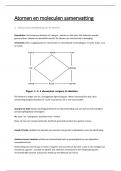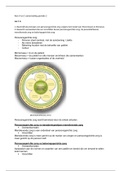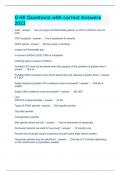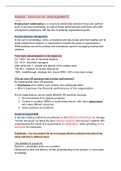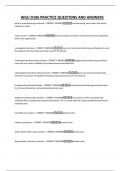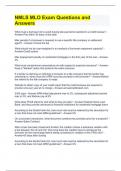Problem 8: Listen to this!
Literature: Goldstein
Function of hearing:
- Signaling (warnings)
- Speech; social connections
Sound stimulus
Perceptual definition: experience when we hear
Physical definition: sound as pressure changes
- pressure change caused by movement or vibration
- any elastic medium (air, water…)
- speaker produce vibrations and transmits them into the air
o condensation = diaphragm moves out → pushes air molecules together. Increase in density of molecules →
local increase in air pressure (on top of atmospheric pressure)
o Rarefaction = diaphragm moves in → molecules fill space → decrease in pressure
→ pattern of high- and low-pressure regions = soundwave
- Soundwaves…
… spread like ripples in water
… moves up and down (→ molecules stay almost on the same spot)
… eventually reach listeners ear
Pure tones
= Simple type of soundwave; rare in environment
- When pattern of pressure change is described as a mathematical sine wave
- Tuning forks produce pure tones
- Amplitude:
o Difference between highest and lowest point of the wave
o Psychological experience of loudness (higher amplitude → louder)
o Range is extremely large
o Decibel (dB)= unit of sound to convert large range of amplitudes to manageable scale
dB = 20 x logarithm (p/p0)
Decibels = 20 x (sound pressure of stimulus/standard sound pressure)
p0 usually set at 20 micropascals (= near threshold of human hearing)
o Sound pressure level (SPL) = indication that 20 micropascals were used in the calculation
o Multiplying pressure by 10 → increase of 20dB (large increase in amplitude → small increase in dB)
- Frequency:
= number of cycles per second (number of times the pressure change occurs)
o Psychological experience of pitch (higher frequencies → higher pitch)
o Measured in Hertz (Hz). 1Hz = 1 cycle
o Human´s audible range: 20Hz – 20,000 Hz
Complex tones
= consists of many pure tones
- Additive synthesis = building complex tones using pure tones
- Periodic tone (repetition/cycles like pure tone)
- Fundamental frequency = repetition rate
- 1st single pure tone = fundamental frequency; later added tones, all with frequency that is a multiple of the
fundamental → = Harmonics
- Frequency Spectrum = way to display harmonic components. Horizontal axis: frequency; height line: amplitude
- Removing 1st harmonic → changes wave form, not repetition rate
o Distance between harmonics is fundamental frequency
Perceiving sound
Loudness
= perceptive quality closely related to amplitude/sound pressure



